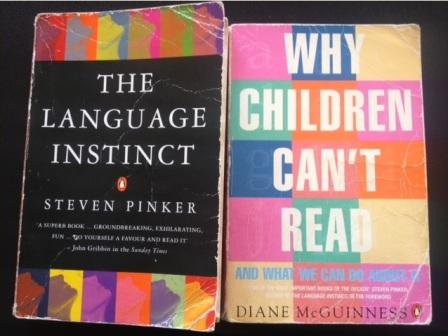Language and Literacy
2 Replies
If you only ever read two books about language and literacy, make them "The Language Instinct" by Steven Pinker and "Why Children Can't Read" by Diane McGuinness.
As you can see, my copies are very bashed up and dog-eared, because I keep going back to them, and sometimes lend them to other people, after extracting the appropriate promises to return them, or else.
"The Language Instinct" was published in 1994, and quickly became a bestseller, because it unpacks what language is and isn't in a readable, witty way, full of juicy stories, examples and information from scientific language research. Pinker is a psychologist, cognitive scientist, linguist and hilarious brainiac author, and whether you know a lot or a little about language, it's a great read, even 20 years on.
"Why Children Can't Read, And What We Can Do About It" is also by an American professor, Diane McGuinness, a cognitive developmental psychologist. Published in 1997, it has a foreword by Steven Pinker, which is what originally made me pay attention to it (yes, I've even read his book about regular and irregular verbs).
Pinker's foreword to McGuinness' book neatly summarises the difference between spoken and written language:
"'Man has an instinctive tendency to speak, as we see in the babble of our young children; while no child has an instinctive tendency to bake, brew or write.' More than a century ago, Charles Darwin got it right: language is a human instinct, but written language is not. Language is found in all societies, present and past. All languages are intricately complicated. Although languages change, they do not improve: English is no more complex than the languages of stone age tribes; Modern English is not an advance over Old English. All healthy children master their language without lessons or corrections. When children are thrown together without a usable language, they invent one of their own.
"Compare all this with writing. Writing systems have been invented a small number of times in history. They originated only in a few complex civilisations, and they started off crude and slowly improved over the millennia. Until recently, most children never learned to read or write; even with today's universal education system, many children struggle and fail. A group of children is no more likely to invent an alphabet than invent the internal combustion engine.
"Children are wired for sound, but print is an optional accessory that must be painstakingly bolted on. This basic fact about human nature should be the starting point for any discussion of how to teach our children to read and write. We need to understand how the contraption called writing works, how the mind of the child works, how to get the two to mesh.
"It is a national tragedy that this commonsense understanding has been so uncommon. We are turning into a nation of illiterates, the victims of misguided ideas about the nature of reading and how to teach it. All the familiar techniques were devised before we had a scientific understanding of reading, and they are based on theories that we know are wrong. Parents and policymakers are bewildered by contradictory advice from a slew of well-meaning but uninformed romantics, oversimplifiers, entrepreneurs and quacks."
This was written more than 15 years ago, but sadly not an awful lot has changed. Last week the Prime Minister was talking about teachers needing to take Running Records of children's reading, and I found myself yelling at the TV, "Show me the Running Record's construct validity!"
Pinker goes on to call McGuinness' book a profound and wonderfully readable essay on how reading and writing should be taught, and the author a proper scientist and expert who writes with style, vigour, insight and compassion. He urges everyone to "Read it for your own pleasure and enlightenment, and buy copies for the people in control of your children's education".
I couldn't agree more, although these days there are more programs around that teach in the way McGuinness recommends than there were in 1997, I hope most of them listed on this website (but please tell me if you know of one that's missing). If anyone wants to have a look at her program "Allographs", I have a copy, but I think it's now out of print.
Perhaps we should all send copies of "Why Children Can't Read" to the Prime Minister, and state and federal Education Ministers. There seem to be heaps available on Bookfinder for under $10, hopefully not all as dog-eared and pages-falling-out-ish as my own. Perhaps if they got a big pile of them in the post, they'd get the message.



Great content and guide that everyone can follow through about learning language and literacy.
Thanks, Kathryn! Hope all is going well for you and you’re staying well clear of the nasty virus. Alison